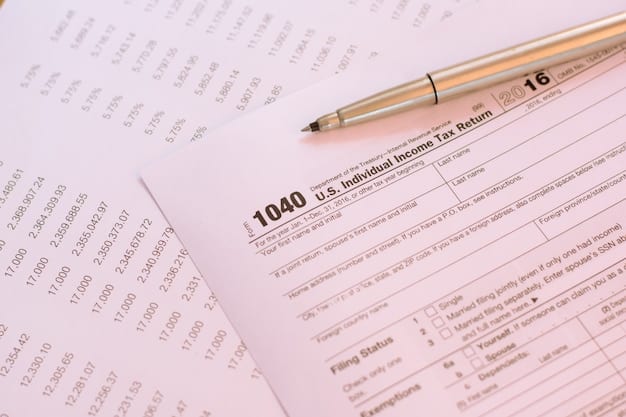Avoid Tax Mistakes: Expert Tips for Filing Your Return Correctly

Avoid These Common Tax Mistakes: Expert Tips for Filing Your Return Correctly by understanding common pitfalls like incorrect filing status, missed deductions, and math errors, and following expert advice to ensure accurate and timely tax return submissions.
Filing taxes can be a daunting task, but knowing what to avoid can save you time, money, and potential headaches. Avoid These Common Tax Mistakes: Expert Tips for Filing Your Return Correctly.
Understanding Common Tax Filing Mistakes
Tax season is often met with a mix of dread and determination. While many taxpayers aim to file accurately and on time, common mistakes can lead to complications with the IRS, resulting in penalties, interest, or even audits. Recognizing these pitfalls is the first step toward a smoother tax filing experience.
Incorrect Filing Status
Selecting the right filing status is crucial, as it affects your standard deduction, tax brackets, and eligibility for certain credits. Common options include Single, Married Filing Jointly, Married Filing Separately, Head of Household, and Qualifying Widow(er).
Missed Deductions and Credits
Many taxpayers overlook valuable deductions and credits that can significantly reduce their tax liability. These can range from common deductions like student loan interest and IRA contributions to more niche credits like the Earned Income Tax Credit (EITC).

Math Errors and Data Entry Mistakes
Simple arithmetic errors and incorrect data entry can trigger red flags with the IRS. These errors can include transposed numbers, incorrect Social Security numbers, or miscalculated income figures.
- Double-Check Calculations: Always review your math and run calculations twice, if needed.
- Verify Social Security Numbers: Ensure all Social Security numbers for dependents and yourself are accurate.
- Use Tax Software: Utilize tax software that automates calculations and data entry to minimize errors.
Avoiding these common mistakes requires diligence, organization, and a good understanding of the tax laws. By taking the time to prepare carefully and double-checking key information, you can minimize your risk of errors and ensure a smoother tax filing process.
Choosing the Right Filing Status
Your filing status directly impacts your tax liability and eligibility for various deductions and credits. Selecting the correct status is paramount, but it’s not always straightforward, especially for individuals with complex family situations.
Single
This status applies to unmarried individuals who do not qualify for another filing status.
Married Filing Jointly
Married couples can file jointly, combining their income, deductions, and credits. This option often results in a lower tax liability compared to filing separately.
Married Filing Separately
Married couples may choose to file separately, but this status often results in fewer tax benefits and may limit eligibility for certain deductions and credits. It’s generally used when couples prefer to keep their finances separate or are in the process of divorce.
Head of Household
This status is for unmarried individuals who pay more than half the costs of keeping up a home for a qualifying child or relative. It offers a larger standard deduction and more favorable tax brackets than the Single filing status.
Qualifying Widow(er)
A qualifying widow(er) can use this status for two years after the death of their spouse if they have a dependent child and meet certain criteria.

- Understand the Requirements: Review the IRS guidelines for each filing status to ensure you meet the eligibility criteria.
- Consider the Tax Implications: Compare the tax implications of different filing statuses to determine which option is most advantageous for your situation.
- Consult a Tax Professional: If you’re unsure about your filing status, seek guidance from a qualified tax professional who can assess your individual circumstances and provide tailored advice.
Choosing the right filing status is a critical component of accurate tax filing. By understanding the requirements and implications of each status, you can optimize your tax outcome and ensure compliance with IRS regulations.
Maximizing Deductions and Credits
One of the biggest opportunities to reduce your tax liability lies in taking advantage of eligible deductions and credits. However, many taxpayers miss out on these benefits due to a lack of awareness or understanding of the rules.
Common Deductions to Consider
Several deductions are commonly overlooked by taxpayers, including:
- Student Loan Interest: You can deduct the interest paid on qualified student loans, up to a certain limit.
- IRA Contributions: Contributions to traditional IRAs may be tax-deductible, depending on your income and whether you’re covered by a retirement plan at work.
- Health Savings Account (HSA) Contributions: Contributions to an HSA are tax-deductible, and the funds can be used for qualified medical expenses.
Tax Credits that Can Save You Money
Tax credits directly reduce your tax liability, dollar for dollar. Some valuable credits include:
- Child Tax Credit: This credit is available for each qualifying child you claim as a dependent.
- Earned Income Tax Credit (EITC): The EITC is a refundable credit for low-to-moderate income workers and families.
- Child and Dependent Care Credit: If you pay for childcare so you can work or look for work, you may be eligible for this credit.
Taking advantage of available deductions and credits requires careful record-keeping and a thorough understanding of the tax laws. Consult the IRS publications or seek professional advice to maximize your tax savings.
Avoiding Calculation and Data Entry Errors
In the rush to file taxes by the deadline, it’s easy to make simple math errors or data entry mistakes. However, these seemingly minor errors can have significant consequences, potentially triggering an audit or leading to penalties.
Double-Check Your Math
Carefully review all calculations, including addition, subtraction, multiplication, and division. Even a small error can throw off your entire tax return.
Verify Social Security Numbers
Ensure that all Social Security numbers for yourself, your spouse, and your dependents are accurate. An incorrect Social Security number can delay the processing of your tax return and potentially result in penalties.
Review Income and Withholding Information
Double-check that the income and withholding information on your W-2 forms matches what you report on your tax return. Any discrepancies can raise red flags with the IRS.
Precision in tax preparation is paramount. By taking the time to thoroughly review and verify your calculations and data, you can greatly minimize the risk of costly errors.
Keeping Accurate Records
Maintaining adequate records is not just a best practice; it’s a cornerstone of sound tax preparation. Proper documentation provides essential support for the figures you report on your tax return and can prove invaluable in the event of an audit.
What Records to Keep
Maintain records of the following:
- Income Documentation: This includes W-2 forms, 1099 forms, and any other documents showing income you received during the year.
- Deduction Documentation: Keep receipts, canceled checks, and other documentation to support your deductions.
- Credit Documentation: Maintain records of expenses that qualify you for tax credits, such as childcare expenses or education expenses.
How Long to Keep Records
The IRS generally recommends keeping tax records for at least three years from the date you filed your original return or two years from the date you paid the tax, whichever is later. However, certain records, such as those related to property you own, should be kept for as long as you own the property and potentially longer.
Organizing Your Records
Establish a system for organizing your tax records to make it easy to find what you need when you’re preparing your tax return or responding to an IRS inquiry. This could involve using file folders, spreadsheets, or digital document management systems.
Diligent record-keeping simplifies tax preparation, reduces the risk of errors, and provides crucial support in case of an audit. Make it a habit to maintain organized and accurate records throughout the year.
Seeking Professional Tax Advice
While many taxpayers are comfortable preparing their own tax returns, complex situations or a lack of expertise may warrant seeking professional advice. Consulting a qualified tax professional can provide valuable insights, ensure accuracy, and help you take advantage of all available tax benefits.
When to Consult a Tax Professional
Consider seeking professional advice if you:
- Have Complex Income Sources: If you have income from multiple sources, such as self-employment, investments, or rental properties, a tax professional can help you navigate the complexities.
- Experience Major Life Changes: Events like marriage, divorce, childbirth, or job loss can have significant tax implications, and a tax professional can guide you through the changes.
- Lack Tax Expertise: If you’re unsure about tax laws or how they apply to your situation, a tax professional can provide clarity and ensure compliance.
Choosing the Right Tax Professional
When selecting a tax professional, consider their qualifications, experience, and fees. Options include:
- Certified Public Accountants (CPAs): CPAs are licensed professionals who have met rigorous education and examination requirements.
- Enrolled Agents (EAs): EAs are federally licensed tax practitioners who have demonstrated expertise in tax law.
- Tax Attorneys: Tax attorneys are lawyers who specialize in tax law and can provide legal advice on complex tax matters.
Seeking professional tax advice can be a wise investment, especially in complex situations. A qualified tax professional can offer tailored guidance, minimize your tax liability, and ensure peace of mind.
| Key Point | Brief Description |
|---|---|
| 📝 Filing Status | Choosing the correct status is important for deduction eligibility and tax rates. |
| 💰 Deductions & Credits | Maximize savings by claiming all eligible deductions and credits. |
| 🔢 Calculation Errors | Double-check all math to avoid IRS flags. |
| 🗂️ Record Keeping | Keep detailed records for deductions and in case of audits. |
Frequently Asked Questions
▼
One of the most common tax mistakes is choosing the incorrect filing status, which can significantly impact your tax liability and eligibility for deductions.
▼
To avoid math errors, double-check all calculations, use tax software that automates calculations, and review your return carefully before submitting it to the IRS.
▼
If you missed a deduction, you can file an amended tax return using Form 1040-X to correct the mistake and claim the deduction you initially overlooked.
▼
The IRS generally advises keeping tax records for at least three years from the date you filed your original return or two years from the date you paid the tax, whichever is later.
▼
Consider seeking professional tax advice if you have complex income sources, experience major life changes, or lack tax expertise to ensure an accurate return.
Conclusion
By being aware of these common tax mistakes and taking proactive steps to avoid them, you can ensure a smoother and more accurate tax filing experience. Remember to choose the right filing status, maximize deductions and credits, avoid calculation errors, keep accurate records, and when needed, seek professional advice, all of which will contribute to a hassle-free tax season and potentially save you money.





